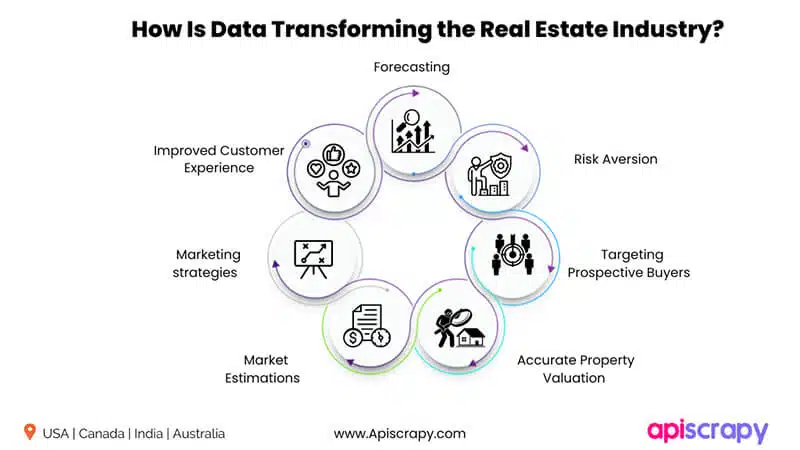
The real estate industry is one of the most dynamic sectors in the global economy, constantly evolving based on market trends, consumer behavior, and economic shifts. For businesses operating in this sector, having access to real-time data is crucial for making informed decisions, identifying investment opportunities, and staying competitive. With the growing demand for real-time insights, the use of real estate data APIs and web scraping technologies has become indispensable for real estate firms, developers, and investors.
In this article, we’ll explore how leveraging a real estate data API combined with web scraping techniques can reveal emerging market opportunities and give businesses the edge they need to succeed. From tracking property listings and analyzing market trends to monitoring competitor activity, these tools provide unparalleled access to data that can transform the way businesses operate in the real estate sector.
What is a Real Estate Data API?

Source: Narola Infotech
A real estate data API is a specialized interface that allows developers and businesses to access real-time property data from various sources, such as property listings, sales history, rental rates, and demographic information. By integrating a real estate data API into their applications or platforms, businesses can automate the process of collecting and analyzing vast amounts of data from the real estate market, providing them with timely and actionable insights.
These APIs are particularly valuable for businesses that need to stay up-to-date with property listings, price changes, and market trends. Rather than manually searching for and compiling this data, a real estate data API automates the process, delivering relevant information in a structured and accessible format.
For instance, a real estate developer might use a real estate data API to track property prices across different neighborhoods, enabling them to identify undervalued properties and potential investment opportunities. Similarly, a rental platform could use the API to update its database of available listings in real-time, ensuring that its users always have access to the most current information.
How Web Scraping Revolutionizes the Real Estate Industry?

Source: apiscrapy
While real estate data APIs provide access to structured data from trusted sources, web scraping offers an additional layer of insight by collecting data from a wider range of online platforms. Web scraping is the process of automatically extracting data from websites, and when combined with a real estate data API, it becomes a powerful tool for gathering comprehensive and granular market intelligence.
For example, web scraping can be used to track property listings across multiple real estate platforms, monitor changes in rental rates, or even analyze customer reviews and feedback on specific neighborhoods. By integrating web scraping with a real estate data API, businesses can create a more complete picture of the market, allowing them to identify trends and opportunities that might not be apparent from traditional data sources alone.
In the highly competitive real estate industry, staying ahead of the curve requires a constant flow of data from various channels. Web scraping provides access to unstructured data that is often missed by APIs, such as social media posts, blog articles, and user-generated content. This type of data can offer valuable insights into consumer preferences, emerging neighborhoods, and market sentiment.
How Real Estate Data APIs and Web Scraping Identify Emerging Market Opportunities?
One of the greatest advantages of using a real estate data API and web scraping is the ability to identify emerging market opportunities before they become mainstream. By continuously monitoring real estate trends, property listings, and demographic shifts, businesses can spot early signs of growth in particular neighborhoods or regions.
1. Tracking Property Price Trends
Property prices are one of the most important indicators of a market’s health and growth potential. With a real estate data API, businesses can track price trends over time and compare them across different regions. This allows investors and developers to identify areas where property values are rising, signaling strong demand and potential investment opportunities.
Web scraping can further enhance this analysis by pulling in additional data from real estate websites, social media, and other online platforms. For example, by scraping rental listing sites, businesses can monitor fluctuations in rental prices, which often provide early clues about shifts in demand for housing in specific areas.
2. Analyzing Demographic Shifts
Population growth, income levels, and demographic changes all play a crucial role in determining the future success of real estate investments. By using a real estate data API, businesses can access detailed demographic data for specific neighborhoods, including population density, age distribution, and household income levels. This information can be used to forecast which areas are likely to experience increased demand for housing in the coming years.
Web scraping can complement this data by collecting information from social media, local news sites, and online forums to gain insights into how people perceive different neighborhoods. For instance, a surge in online discussions about a particular neighborhood could indicate that it is becoming more popular, even if traditional data sources have not yet caught up.
3. Monitoring Competitor Activity
In any competitive industry, keeping an eye on what your competitors are doing is essential to staying ahead. A real estate data API can be used to track the properties that competitors are listing, the prices they are setting, and the markets they are targeting. This allows businesses to benchmark their own strategies against those of their competitors and adjust accordingly.
Web scraping takes this a step further by enabling businesses to monitor competitors’ websites, blogs, and social media accounts in real time. This can reveal valuable insights into how competitors are marketing their properties, which areas they are focusing on, and what types of properties they are prioritizing. By staying informed about competitor activity, businesses can make more strategic decisions about where to focus their own efforts.
Why Real Estate APIs Are Essential for Growing Businesses
For businesses looking to scale in the real estate industry, the use of a real estate data API is essential. As markets become more complex and competitive, relying on manual data collection methods is no longer viable. APIs provide access to real-time, structured data that can be easily integrated into existing platforms and used to automate a wide range of business processes.
1. Automating Data Collection
The automation of data collection is one of the most significant benefits of using a real estate data API. Instead of manually searching for property listings, sales data, or demographic information, businesses can use APIs to pull in this data automatically, freeing up valuable time and resources. This enables teams to focus on analyzing the data and making informed decisions, rather than spending hours gathering information.
2. Real-Time Market Insights
Real estate markets move quickly, and businesses need to be able to react to changes in real-time. A real estate data API provides up-to-the-minute data on property listings, prices, and market trends, allowing businesses to stay ahead of the competition. Whether it’s identifying a new investment opportunity or adjusting pricing strategies, real-time data is critical for success in the real estate industry.
3. Customization and Flexibility
The best real estate APIs offer a high degree of customization, allowing businesses to tailor their data collection efforts to their specific needs. Whether you’re focused on a particular geographic region, property type, or market segment, a real estate data API can be configured to deliver the exact data you need to make informed decisions.
Moreover, APIs are flexible and can be integrated into a variety of platforms, from customer relationship management (CRM) systems to real estate websites and mobile apps. This makes it easy for businesses to incorporate real-time data into their daily operations and decision-making processes.
Conclusion
In today’s fast-paced real estate market, having access to timely and accurate data is essential for success. By leveraging a real estate data API in conjunction with web scraping, businesses can gain deeper insights into market trends, competitor activity, and emerging opportunities. Whether you’re an investor, developer, or real estate platform, these tools provide the data you need to make smarter decisions and grow your business.
With the right real estate data API and web scraping tools in place, businesses can automate their data collection efforts, access real-time insights, and identify new opportunities before their competitors. In a sector as dynamic as real estate, staying ahead of the curve is crucial, and these technologies make it possible.By integrating advanced data collection tools into your operations, you can unlock new growth opportunities and position your business for long-term success in the ever-evolving real estate market.


















